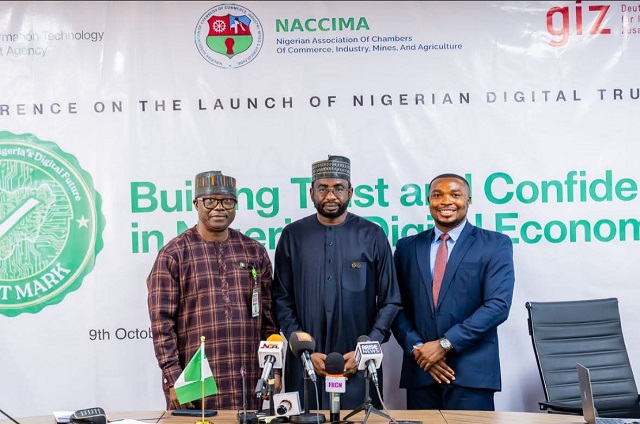In a bold move to rebuild public trust and safeguard Nigeria’s growing digital economy, the National Information Technology Development Agency (NITDA) is set to launch the Nigerian Digital Trustmark Seal, a landmark initiative aimed at verifying the authenticity of online platforms, businesses, and organisations across the country.
The initiative, co-created by NITDA in collaboration with the National Association of Chambers of Commerce, Industry, Mines and Agriculture (NACCIMA) and the Deutsche Gesellschaft für Internationale Zusammenarbeit (GIZ), seeks to strengthen cybersecurity, combat online fraud, and promote transparency in Nigeria’s digital ecosystem.
Speaking during a press conference held in Abuja to commemorate Cybersecurity Awareness Month, NITDA’s Director General, Kashifu Inuwa, said the Digital Trustmark Seal forms a core part of the government’s broader drive to deliver on President Bola Ahmed Tinubu’s priority of strengthening national security through robust cybersecurity measures.
“The digital economy has been the fastest-growing sector in Nigeria for almost five years, surpassing oil and gas in GDP contribution,” Inuwa noted. “However, as we digitise, challenges emerge. Technology is a double-edged sword, and while good actors use it to drive efficiency, bad actors exploit it to cause harm and erode public trust.”
According to him, the Digital Trustmark Seal will serve as a visible badge of authenticity on verified websites, allowing citizens to easily identify genuine platforms and steer clear of fraudulent or cloned ones often used for scams and identity theft.
“It’s an initiative designed to build trust within our digital ecosystem, where every company, e-commerce platform, business, and government organisation will have a Trustmark seal on their website to ensure authenticity,” he explained.
Inuwa emphasised that the initiative aligns with the Renewed Hope Agenda of President Tinubu, which prioritises transparency, inclusiveness, and public trust in governance, and added that the Trustmark project underscores the need for collaboration between the public and private sectors in creating a safer and more resilient digital environment.
“This initiative will also work closely with the private sector. They are the main drivers of adoption, and it won’t be a challenge because, for them, it helps build reputation and customer confidence,” he said. “For citizens, it builds confidence and trust that when they interact and transact online, they are dealing with authentic websites and providers.”
Beyond cybersecurity, Inuwa stressed that building digital trust is a collective responsibility that also involves the media and civil society.
“The media play a vital role in enlightening citizens, amplifying awareness, and helping to rebrand Nigeria’s image on the global stage,” he remarked.
Representing NACCIMA, Mr. Suleiman Adebayo Audu, Advisor to the Association, described the Digital Trustmark Seal as “a timely and impactful effort” that will boost both business confidence and Nigeria’s international reputation.
“Many genuine Nigerian businesses lose customers due to a lack of trust,” Audu said. “This seal will help restore credibility and make Nigerian SMEs more competitive globally. NACCIMA will work with our state chambers to sensitise members and support them through the verification process.”
Also speaking, Mr. Chinedu Albert, a consultant with GIZ, reaffirmed the organisation’s commitment to the project, noting its alignment with GIZ’s mission to promote safe, inclusive, and transparent digital ecosystems across Africa.
“Trust is the foundation of every digital transaction,” Albert said. “Without it, progress slows down. Our role is to provide technical expertise and international best practices to ensure the seal serves all, including women-led businesses and startups.”
Delivering a project overview, the Director of NITDA’s Cybersecurity Department, Dr. Mohammed Lawan, described the initiative as a major milestone in Nigeria’s journey toward a secure and trustworthy digital economy.
“Trust is the currency of the digital economy,” Lawan stated. “This seal will serve as a verifiable digital signature, reducing fraud and enhancing Nigeria’s reputation globally.”
He disclosed that NITDA would soon commence nationwide stakeholder engagements, capacity-building workshops, and sensitisation programs to drive adoption and ensure the effective rollout of the Nigerian Digital Trustmark Seal.

